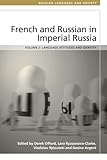French and Russian in Imperial Russia : Language Attitudes and Identity / Lara Ryazanova-Clarke, Gesine Argent, Derek Offord, Vladislav Rjeoutski.
Material type: TextSeries: Russian Language and Society : RLSPublisher: Edinburgh : Edinburgh University Press, [2022]Copyright date: ©2015Description: 1 online resource (288 p.) : 5 B/W illustrationsContent type:
TextSeries: Russian Language and Society : RLSPublisher: Edinburgh : Edinburgh University Press, [2022]Copyright date: ©2015Description: 1 online resource (288 p.) : 5 B/W illustrationsContent type: - 9780748695539
- 9780748695546
- 447.947
- PC3680.R8 F74 2015
- PC3680.R8
- online - DeGruyter
- Issued also in print.
| Item type | Current library | Call number | URL | Status | Notes | Barcode | |
|---|---|---|---|---|---|---|---|
 eBook
eBook
|
Biblioteca "Angelicum" Pont. Univ. S.Tommaso d'Aquino Nuvola online | online - DeGruyter (Browse shelf(Opens below)) | Online access | Not for loan (Accesso limitato) | Accesso per gli utenti autorizzati / Access for authorized users | (dgr)9780748695546 |
Frontmatter -- Contents -- Preface -- Note on Dates, Transliteration and Other Editorial Practices -- Abbreviations Used in the Text, Notes and References -- Dates of Reigns in Eighteenthand Nineteenth-Century Russia -- Introduction -- Chapter 1 The Pan-European Justification of a Multilingual Russian Society in the Late Eighteenth Century -- Chapter 2 Princess Dashkova and the Politics of Language in Eighteenth-Century Russia -- Chapter 3 Plating 'Russian Gold' with 'French Copper': Aleksandr Sumarokov and Eighteenth-Century Franco-Russian Translation -- Chapter 4 Francophone Culture in Russia Seen through the Russian and French Periodical Press -- Chapter 5 Linguistic Gallophobia in Russian Comedy -- Chapter 6 The Linguistic Debate between Karamzin and Shishkov: Evaluating Russian-French Language Contact -- Chapter 7 Language and Conservative Politics in Alexandrine Russia -- Chapter 8 Seduction, Subterfuge, Subversion: Ivan Krylov's Rewriting of Molière -- Chapter 9 The French Language of Fashion in Early Nineteenth- Century Russia -- Chapter 10 : Оmечесmво оmчuзна роduна Russian 'Translations' of Patrie in the Napoleonic Period -- Chapter 11 Treatment of Francophonie in Pushkin's Prose Fiction -- Chapter 12 Love à la mode: Russian Words and French Sources -- Conclusion: Gesine Argent and Derek Offord -- Notes on Contributors -- Index
restricted access online access with authorization star
http://purl.org/coar/access_right/c_16ec
Explores how knowledge of French helped shape Russian identities and their views on the Russian languageThis is the second of two companion volumes which examine language use and language attitudes in eighteenth- and nineteenth-century Russia, focusing on the transitional period from the Enlightenment to the age of Pushkin. Set against the background of the rapid transformation of Russia into a major European power, the two volumes of French and Russian in Imperial Russia consider the functions of multilingualism and the use of French as a prestige language among the elite, as well as the benefits of Franco-Russian bilingualism and the anxieties to which it gave rise.This second volume, Language Attitudes and Identity, explores the impact of French on Russian language attitudes, especially among the literary community. It examines the ways in which perceptions of Russian francophonie helped to shape social, political and cultural identity as Russia began to seek space of its own in the European cultural landscape. In the process, it investigates approaches to translation, journalistic debate about language, literary representation of devotees of French social practice and fashion, and manifestations of linguistic purism and patriotism.A comprehensive and original contribution to the multidisciplinary study of language, the two volumes address, from a historical viewpoint, subjects of relevance to sociolinguists (especially bilingualism and multilingualism), social and cultural historians (social and national identity, linguistic and cultural borrowing), Slavists (the relationship of Russian and western culture) and students of the European Enlightenment, Neo-Classicism, Romanticism and cultural nationalism.
Issued also in print.
Mode of access: Internet via World Wide Web.
In English.
Description based on online resource; title from PDF title page (publisher's Web site, viewed 02. Mrz 2022)


